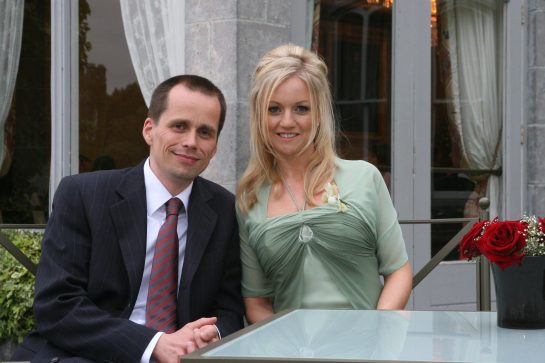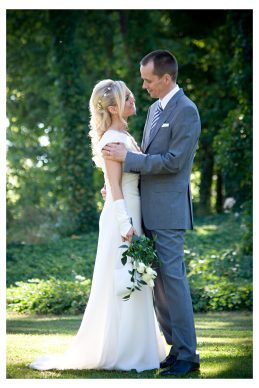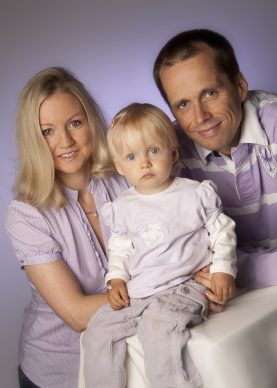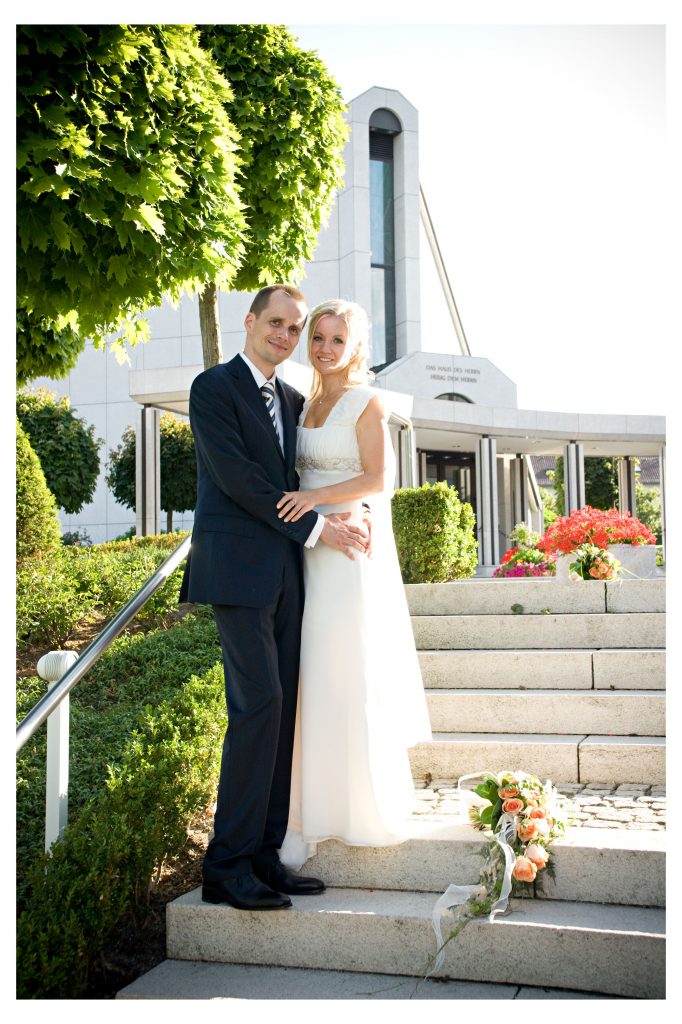As an ambitious young lawyer pursuing her doctorate at The Hague, The Netherlands, Dagmar was introduced to the Church through her roommate. After serving a mission at age 29, Dagmar landed her dream job on the Yugoslavia Tribunal at The Hague, only to give it up when she was specifically recruited to work instead in the Church’s public affairs department for Europe. Now as a mother and wife, Dagmar still works part-time as a general counsel to the Church in Frankfurt, Germany. It has sometimes been painful and lonely for her to follow those doors that have been opened to her and leave behind those that have been shut, but she believes the Lord is aware of her and is making use of her tremendous skills.
What prompted you to choose international human rights law as your career?
Even as a young girl, I thought there should be more justice in this world. Anything that was unjust or unfair frustrated me. I remember at school a group of children decided they would not talk anymore to a particular girl. I thought, “That is not fair! Why would you want to do that?” And so I kept being a friend to her, which made me feel very peaceful.
I grew up in southwest Germany, in a small village close to the city of Worms. I had a great childhood and a wonderful family. I enjoyed going to school. I did ballet and played the piano. I was a happy child and very fortunate. But I remember noticing that some children were not as fortunate as me. I thought that wasn’t fair. There was no one to blame, but in my mind, I thought they deserved better. I wished the world were more just to them. That’s how my interest in being a lawyer began.
Of course, that was probably the worst reason ever to become a lawyer. The very first thing I learned in law school is that justice and law have nothing to do with each other. The professor told us that they’re totally different things and all those students who were there because they felt like doing something for justice–they were in the wrong place.

Well, I didn’t leave. And I found out later in my studies that with international law you can at least try to fight for the cause of justice, for human rights.
I went to law school in Heidelberg, Germany, and followed some classes in Italy. Following that, I went to the Netherlands to do my PhD. I specialized in international law and wrote my dissertation about the International Criminal Tribunal for the Former Yugoslavia, a United Nations court of law dealing with war crimes that took place during the conflicts in the Balkans in the 1990s. I also worked part-time at the Tribunal while I wrote my dissertation. When I finished my PhD, I went back to do my bar training in Germany.
How did you come to join The Church of Jesus Christ of Latter-day Saints?
I was a practicing Catholic growing up. We went to church every Sunday. I went to First Communion at age 8 and to Confirmation at age 14. But there were doctrines and teachings in the Catholic Church which I disagreed with. For example, the doctrine of the Trinity: I never, ever agreed with that. So the Catholic Church became less and less important to me. At some point I decided I did not need a church in order to be a faithful person. I never lost my faith in God, though. I always had a very strong conviction that God and Jesus Christ existed.
But life was hard at university. I was part of a huge group of students and the ambition among them was extreme and not very friendly. There was fighting for books, fighting for better grades. I yearned for comfort, so I began to look for an organized religion again. I knew I wouldn’t find the close relationship to God I wanted in the Catholic Church, so I looked elsewhere, in evangelical churches and even some Eastern traditions. But nothing gave me the answer I was looking for.
When I received my degree from Heidelberg, I had many questions about where I should go next. I had been to The Hague, The Netherlands, the “capital” of International Law, briefly, and I felt drawn back there. I prayed intensely and persistently about very worldly matters like money, like housing. I said, “OK, Lord, if Thou wants me to go to The Hague, then I need a room there, and I need some income.” One thing opened after another. A friend told me of an apartment. I won a scholarship. The Lord prepared the way.
My roommate in The Hague impressed me because her life basically was the opposite of mine. She lost her mother when she was young, only thirteen. After her mother died, her father moved to France so she lived with her grandmother for a while and then with another person for a while. Her childhood seemed to me unstable and sad but nevertheless she became a very happy, beautiful, optimistic person.
I always compared myself to her and thought, “If I had lost my mother at age thirteen, I probably would have been so sad and so hurt and so full of hatred with the world that I would have never managed to become a normal person or a happy person. It would have just destroyed my life!” But she had something that made her so happy and beautiful.
I asked her about it. She explained to me that she knew that she would see her mother again and that they would be an eternal family. She was a flight attendant but whenever she was in town on Sunday, she went to church. Since I was looking for a church I thought that maybe I could just go with her once. I asked her and she said, “Yes, of course. But I am a Mormon and we have only one chapel in The Hague and we have to travel through the whole city to get there.”
The moment she said “Mormon,” I knew I had to have that. I didn’t know what “Mormon” meant, but I just knew that I had to become a Mormon too. At all costs. The Spirit testified to me that whatever she was telling me was right. She gave me the Book of Mormon before we went to church. I started reading it and I never had a doubt. I never prayed whether it was true or not – I just knew it was.

On my 26th birthday, I was baptized in The Hague chapel. When I found the gospel I finally felt like a fish in the water. I had flapped in the air for so long, seeking for water. I felt liberated! I felt free!
It was wonderful to live the gospel! It wasn’t challenging: I had never smoked, I didn’t really like alcohol, I always tried to live high moral standards. That wasn’t new to me. Instead, in the gospel I found pleasant and peaceful answers. For example, when I was ten years old and had to bury my grandparents, it was extremely hard, because no one knew exactly where they would go and whether I would see them again. But when I found the Church I finally got the answer: yes, we can be an eternal family. The gospel gave me answers and direction.
You served a mission. Tell me about how you came to the decision to go on a mission.
Shortly after I was baptized, I was thinking about a mission myself. But as I investigated whether I should serve a mission, the quotation from Pres. Hinckley always came up where he said that it is not expected of women to serve a mission and that women should go on with their education and their career. This convinced me that a mission wasn’t meant for me. So I continued and finished my PhD.
Later, when I was doing my bar training, I talked to a young woman who had just come back from her mission. She had so many great stories that I loved listening to! One night, after spending the evening talking to her, I said jokingly to myself before I went to bed “OK, if I fail the bar exam I will go on a mission.”
The next morning I woke up and I immediately knew that it was not a joke at all but that I had to serve a mission, no matter the outcome of the bar exam. I was extremely surprised, even frightened, because I was already 29 – pretty old for a mission, but that was just what the Lord had in mind for me.
My family, of course, was furiously afraid for me when I told them I was going on a mission. At that time, it was difficult for a lawyer to find a job in the first place and then, if you leave the law only for several months, you are not current because the law changes basically every day. You must update your skills all the time. My family was afraid that if I went on a mission for 18 months that no law firm would ever be interested in me.
Then, after the call came, they were even more afraid for me because I was called to Temple Square. They thought, “Why in the world would they need missionaries in the headquarters?” They had heard bad things about minority churches, things about brainwashing, so they were afraid that bad things would happen to me.
Yet, they would let me go. I remember my father’s words. He said, “You know this is not exactly what we had hoped and planned for you, but if this is what you really want to do, we will support you and help you in any way we can. Just promise me one thing–if you feel lonely or if you are sad, just come home immediately.” He totally thought of himself in the second place. The only thing that was important to him was that I be happy.
While I was on my mission, my family came to visit me once at Temple Square. They saw that I was very happy. Of course I hoped that they would feel the Spirit and become converted, but it did not happen that way. They still are very supportive but they are happy in their own church.
How did you restart your career when your mission ended?
After my mission, I went home to my parents in Germany and started job hunting. My parents’ fears for my professional life were fully justified. I got very harsh replies everywhere I applied. People simply would not consider my application, regardless of my degrees. They only saw that I had just finished a mission for a minority church, and they would not even consider hiring me.
The response was so discouraging that I didn’t know where to go or what to do. Friends in the Netherlands saw I could not find a job and saw how desperate I was. A member of the Church there suggested, “Why don’t you try with the Yugoslavia Tribunal again, because we now have a member there who is one of the managers.”
I contacted him, and he said, “I am actually looking for a temporary person in my department.” I filled every one of the requirements for the job. So he and another manager gave me an interview and they accepted my application, just for a temporary job at first, but I have no doubt that the Spirit led me there.
After a few weeks I was offered one of the most coveted jobs at the Tribunal, a permanent position assisting a judge. This was the best job I ever had. I was so happy working for the judge, writing opinions and drafting memoranda. It was perfect. It was an exciting place. I was surrounded by young attorneys from all over the world. We were writing history because this kind of Tribunal was something totally new. I thought I would stay there as long as the Tribunal existed. That was my plan.
But my plan changed. One beautiful morning I was riding my bike to the Tribunal through the forest in The Hague, looking forward to my work and thinking how extremely happy I was to have the job I had, when I heard this voice in my head, “Then enjoy it as much as you can, because you won’t stay very long.”
Two days later I received a telephone call from the president of the Central Europe Area here in Frankfurt, who was at that time Marlin K. Jensen. He said, “Dagmar, we have a job opening in the Public Affairs Department, and we would like you to apply.”
I had met Elder Jensen after my mission. My mission president knew him and had suggested I meet with him when I was back in Germany since he was also a lawyer and might have an idea of how I could get a job. Elder Jensen invited me to lunch with the entire area presidency. The most spiritual lunch I ever had! I told them then I didn’t want to work for the Church because I loved to be among members of other faiths. But they thought of me when this job opening came. And because the Spirit had already warned me, I knew what to do!
Actually, it wasn’t that simple. Not at all. I struggled. I was troubled. I listed the advantages and disadvantages. The list for The Hague and the Tribunal was a very long list, and there was no disadvantage at all. For Frankfurt and working for the Church, there was only one advantage. And that was that it was the Church of Jesus Christ. I wanted to serve Christ in any way I could. That was sufficient reason for me to quit my job and come to Frankfurt.
But it was hard. For me, it was very difficult leaving the Tribunal. I loved The Hague, and I loved the work environment. In taking the job with the Church, I didn’t know exactly where I was going. But I trusted the Spirit.
When I came to Frankfurt I began to realize what I had lost. I had worked at the Tribunal for a judge who was extremely challenging and demanding, and who taught me new things every day. When I first started working for the Church I had a very, very administrative position in the Public Affairs department. I was under-utilized and felt unchallenged.
Also, in the move to Frankfurt from The Hague, I had lost all my colleagues and friends. I felt very lonely. My co-workers were all church members who already had their families and their wards. There were hardly any people my age in my office, so it took a while before I found friends. That was very hard. It was a dark time for me.
In my prayers and study, though, I felt that I wasn’t alone and that coming to Frankfurt had been the right thing. In a while, the Lord led me to a very good friend. The Lord, the scriptures, and my friend, they pulled me through.
I changed departments and joined the legal department, which was a source of greater satisfaction because that used more of my training. I’m now Legal Coordinator at the Office of General Counsel of the Church in the Europe area. I have been assigned missionary visas and government relations. I help missionaries in the Europe area with visas and residency permits, helping them to stay legal in their assigned countries. In many countries they have difficulties. With government relations, I am in charge of establishing contact with European governments and helping the Church improve its standing.
In addition to changing departments, my attitude changed. I finally began to realize exactly what I am doing. Sometimes it is only administrative–I am just writing emails or such things. But in my small way, in baby steps, I am helping the Lord’s church to grow here in this area. That gives me great satisfaction. I don’t regret leaving the Tribunal anymore. I think I finally understand what I’m doing and for Whom I’m working.
You started your career with a passion for justice. Is that a passion that you have set aside or something that you work toward in your current job?
Part of justice is making sure that people wherever they are can enjoy religious freedom. I think that with the work that I’m doing, I’m helping not only the cause of the Church, but also the cause of religious freedom in general. In that regard, my goal has stayed the same.
In another way, though, my goal has changed. I’m very focused on sharing the gospel and doing missionary work through my work. So in that way, my professional life has a different emphasis than I had expected when I was in law school.
How else has moving to Frankfurt changed your life?
I think one of the reasons I had to leave The Hague to come here to Frankfurt was to meet my husband. In a blessing when I finished my mission, I was told that my job would bring me to my husband.
When I first came to Frankfurt, the senior missionaries in my office thought I should get married, so they arranged dates for me. I think in one year I dated every single person in southern Germany and Switzerland. It was frustrating because Mr. Right wasn’t among them. Finally another friend who knew both my husband and me arranged for a date without “warning” either of us before . I knew from the first moment I saw him, that it was him. So, just as the blessing had promised, my job–coming here to Frankfurt–led me to my husband.
You are very close to your parents. What happened when you announced your marriage plans to them?
I was nervous when we went to explain to them that we would be married in the temple. I knew it would disappoint them, and I hate to disappoint my parents, but there was no other way. My mother was a little bit hurt that she couldn’t be there. But we had a beautiful ring ceremony in a chapel, which is right on the temple grounds, after our sealing.
Also, during our sealing my family and friends were allowed to have a tour through the temple grounds and even through the lower part of the temple, up until you reach the reception desk. I think because they were allowed to enter a little bit of the temple, and because of all the attention they received from our wonderful recorder in the Frankfurt Temple, who gave the tour, that helped a lot.

You have a seventeen month old daughter, Ann-Sophie. Tell me about how you have combined work and motherhood.
For a year, I was only a mother, and I found that totally rewarding. For several different reasons, though, I had to go back to work at least part-time. It’s nice that I can use a different part of my brain for some hours per week. It’s a very nice balance. For four days I am a full-time mom and then three days I am working a little bit.
I am really fortunate that I have family living very close to us. We live in Friedrichsdorf – a small town where the Frankfurt Temple is located – and my sister-in-law and parents-in-law both live there as well. They take care of Ann-Sophie two days a week and one day my husband is home, so she is always with family. My husband and I are glad we have found a way that he and I can both take care of her.
But still there are challenges with working and being a mother. You want to do both perfectly: you want to be perfect at your job but also be a perfect mother. Having both jobs, here at the office and as a mother, is all-consuming.
Of course I am not in a position to do as much scripture study and intense prayer as I did before I had a child, but I feel that the Lord expects less from me time-wise when it comes to scripture study and prayer than He did when I was single. I open my scriptures every day but sometimes I have the impression I get out of five minutes of intense study as much as I did in half an hour before. I think the Lord recognizes when we are trying to do what we can, however little that may be, and is willing to open our spiritual understanding immediately.
At A Glance
Dagmar Patricia Kollmeier
 Location: Frankfurt, Germany
Location: Frankfurt, Germany
Age: 39
Convert to Church?: 1 June 1997
Marital status: Married to Björn Kollmeier (met in 2007, married in 2008, first child born in 2009)
Children: One daughter, Ann-Sophie Madleen, 17 months
Occupation: Lawyer
Schools Attended: Rudi-Stephan-Gymnasium Worms, Law school at University of Heidelberg, Germany, and Ferrara, Italy
Languages Spoken at Home: German
Favorite Hymn: “A Child’s Prayer”
Interview by Annette Pimentel. Photos used with permission.
At A Glance

